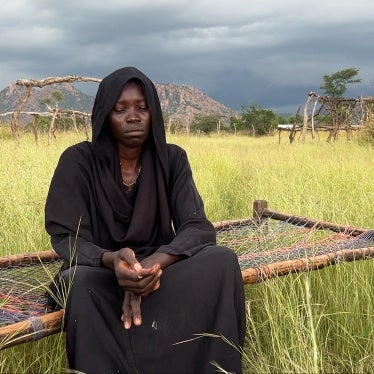The Spanish government should immediately suspend the deportation of undocumented migrants to Morocco from the Spanish enclaves of Ceuta and Melilla, Human Rights Watch said today.
Over the past two weeks, some 2,000 people have attempted to enter Ceuta and Melilla by storming the fences that surround these two Spanish cities located on the North African coast and adjacent to Morocco. At least 11 people have died and scores have been injured, as Spanish and Moroccan troops attempted to block their passage into the enclaves. Hundreds of people are being housed in a temporary residence center and a makeshift camp in Melilla.
“Shipping people back to Morocco is not an answer to this crisis,” said Holly Cartner, Europe and Central Asia director at Human Rights Watch. “Protecting these extremely vulnerable people should be the Spanish government’s priority.”
There are alarming reports of human rights violations against migrants deported to Morocco from Spain or detained in Morocco as they tried to enter Ceuta or Melilla. Médecins Sans Frontières on Friday said that, in the desert near the Moroccan-Algerian border, it had discovered more than 500 people abandoned by Moroccan police without food or water. The Moroccan government has reportedly begun transporting hundreds of men, women and children in bus convoys towards the border with Algeria, claiming that the migrants passed through there before entering Morocco. Reportedly, many of the migrants have been handcuffed in pairs and have not been given food or water.
On October 6, Spain expelled at least 70 people from the enclaves to Morocco, on the basis of an ad hoc bilateral agreement, and is seeking to reactivate a 1992 agreement with Morocco that allows it to return people of any nationality to Morocco if they entered Spain illegally from that country. The European Commission has proposed placing Morocco on a list of “safe countries” that would limit the right of persons who transit through Morocco to seek asylum in the European Union. It is urging Morocco to sign a returns agreement with the European Union that would allow third-country nationals who transit through Morocco to be returned there.
“Morocco must do far more to respect the basic human rights of migrants before it can be considered a safe country for returns,” said Cartner. “This is hardly the time to be discussing an EU returns agreement with Morocco.”
There are reports of excessive use of force by both Spanish and Moroccan border patrols. On September 29, five migrants were killed, apparently by gunfire, as a group of over 500 people rushed the fence at Ceuta. Two bodies were found on Spanish soil, while the other three were found on the Moroccan side of the fence. On October 5, six men were shot and killed on Moroccan territory by Moroccan police officers. The Moroccan government has described the actions of its police as “legitimate self-defense” in response to attacks with rocks and bottles. There are numerous reports of beatings and other ill-treatment by security forces on both sides of the fences.
“Allegations that Moroccan and Spanish officials were involved in the deaths of migrants are extremely serious,” said Cartner. “These incidents require an independent international investigation.”
The U.N. special rapporteur on the human rights of migrants would be well placed to look into the situation, Human Rights Watch said. In addition, the Ombuds Institution (Defensor del Pueblo) in Spain and the Advisory Council for Human Rights (Conseil Consultatif des Droits de l'Homme) in Morocco should conduct inquiries into the violence.
An internal investigation conducted by the Spanish Civil Guard into the deaths of the two men found in Spanish territory on September 29 exonerated the Civil Guard from any involvement. It concluded that the fatal shots were fired from a long distance and the bullets do not match the type used by the Civil Guard, the report concluded. The Spanish Interior Minister, José Antonio Alonso, has said that the Moroccan government is investigating the deaths of the three people found on Moroccan territory.
Both Spain and Morocco should improve training of border patrol forces in appropriate and proportionate crowd control measures in accordance with international standards such as the U.N. Code of Conduct for Law Enforcement Officials and the U.N. Basic Principles on the Use of Force and Firearms by Law Enforcement Officials.
Spain has an obligation under both national and international law to ensure that all those on its territory who wish to apply for asylum are given the opportunity to do so. This means that all those detained upon entering Ceuta and Melilla should be provided with clear information, in a language they can understand, about their right to apply for asylum and the necessary guidance as to the procedure to be followed. Spain and Morocco have an obligation not to send people to countries where they would face the risk of persecution or torture, or where their lives would otherwise be at risk.






